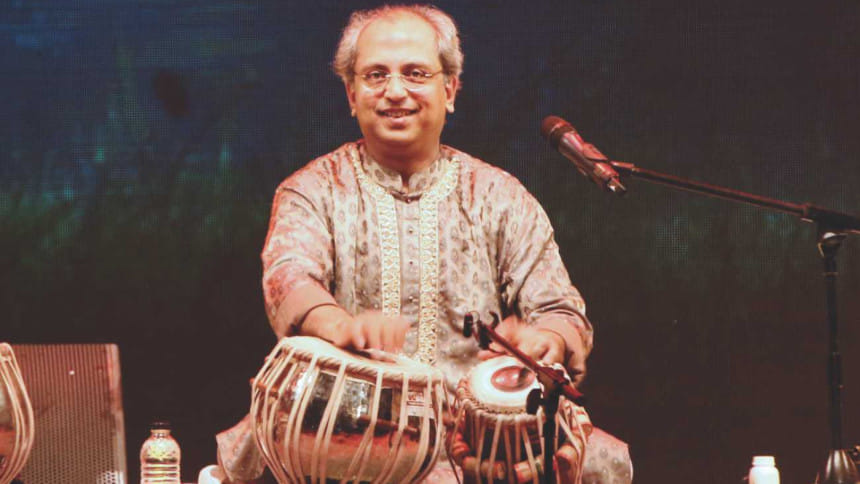You must turn your practice into a sadhana…Pandit Yogesh Samsi

Photo: Sheikh mehedi morshed
A man of a quiet and humbling nature, Pandit Yogesh Samsi is one of the few tabla players whose status and reputation have been built on his precise and perfected artistic ability, as both an accompanist and a soloist. He is the son of the renowned vocalist Pandit Dinkar Kaikini ji. Pandit Yogesh Samsi's father was the one who initiated him into tabla at the tender age of four. Later, he received guidance under Pandit H. Taranath Rao. But it was under the tutelage and training of the legendary Ustad Alla Rakha for twenty three years that gave him the ability to mature into the fine tabla player that he is today. Pandit Yogesh has accompanied almost all the top ranking instrumentalists. He played alongside Pandit Shiv Kumar Sharma and Pandit Tajendra Narayan Majumder in this year's edition of the Bengal Classical Music Festival. He had also performed a duet with Pandit Subhankar Banerjee. During a brief chat with the Maestro, he speaks about his experience with the Festival and the audience in Bangladesh, and gives some tips to the youth about how to carry the art forward.
You've been coming every year; this is your fifth year. Have you seen progress in terms of number of audience or their connection to the music?
First of all I'd like to say that I came here like 25 years ago with Ustad Rashid Khan and that was for a very small gathering. But the past five years, I have been coming every year, and I must say that the audience is totally connected with Indian classical music, and art and culture. And so, I don't see the scope of the audience growing anymore, because it's absolutely colossal! It's a huge audience and it proves that even if there is limited scope of learning or being connected with the art form in terms of Indian classical music, I don't see any lacking when it comes to connecting with the audience here in Dhaka. I feel so connected with the audience every time I perform. There is appreciation at the right places, in the right intensity. And there are so many aspiring young students who are pursuing music and are learning this. So I must say it's a fantastic experience to be here every year.
To pursue a classical art form, it takes a lot of devotion and time. And considering the world we live in today, with so much competition and chaos, it becomes very difficult for the students to give in that amount of dedication and time. How do you think the youth of today's world can tackle that to be able to one day get to where you are?
That's a very good question. Actually, I would say the way we learned Indian Classical Music at that time in the Guru-Shishya tradition, there was not much happening in terms of a lot of opportunities, or a lot of concerts, or any form of exposure for a young aspiring musician who is in the prime of his or her training period- the lack of which is very important to remain focused; to be away from the commercial scene, to be away from the performing scene, and to be concentrating on development, and maturing into a fine artist. So, sacrifices were made even then. All I can say is that the sacrifices have become greater today, because today there are so many attractions and distractions. Young people get so easily distracted from their main focus of training. And to tackle that, you need a good environment and a good guru-- a 'samarth' (powerful or efficient) guru. With that in hand, that level of dedication can be brought out and achieved. And I think Bengal Foundation is doing the right thing, by having an academy here, having excellent gurus come in from India and instilling those values into the students. So, I think with more such initiatives, the youth will be guided in the right direction.
Can you share some words of advice for the youngsters, who are pursuing Hindustani Classical music and looking up to you and aspiring to be where you are?
All I can say is that you must stay focused; you must be dedicated to your Sadhana (disciplined pursuit). Just mere practice will not do. You must turn your practice into a Sadhana. If you are aspiring to be professionals, you must be restless if it is not done everyday. It must become a sadhana so that it is a deeper experience for you. If that happens- over a sustained period of time, the goals that you want to achieve are certain.

 For all latest news, follow The Daily Star's Google News channel.
For all latest news, follow The Daily Star's Google News channel. 



Comments